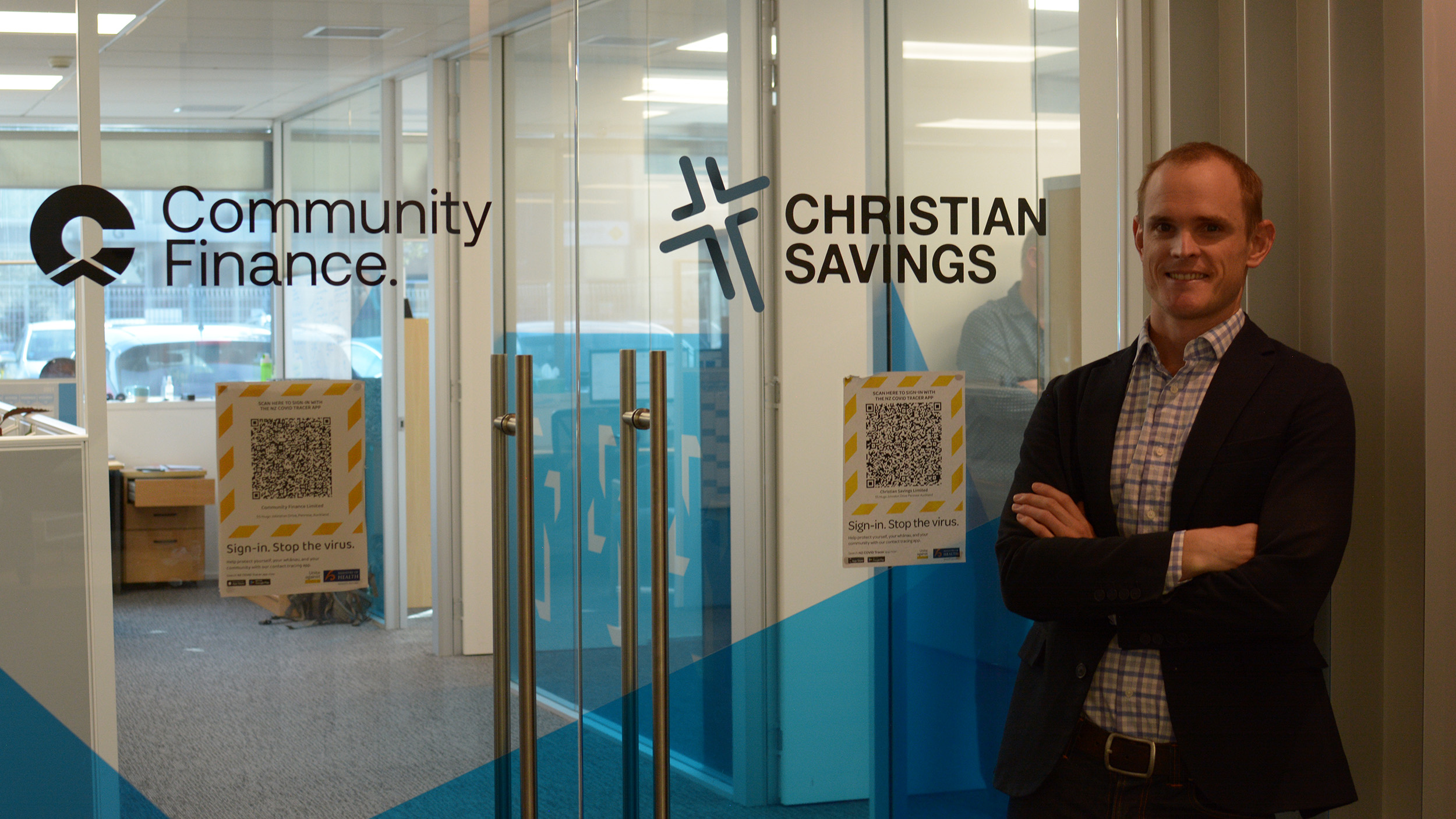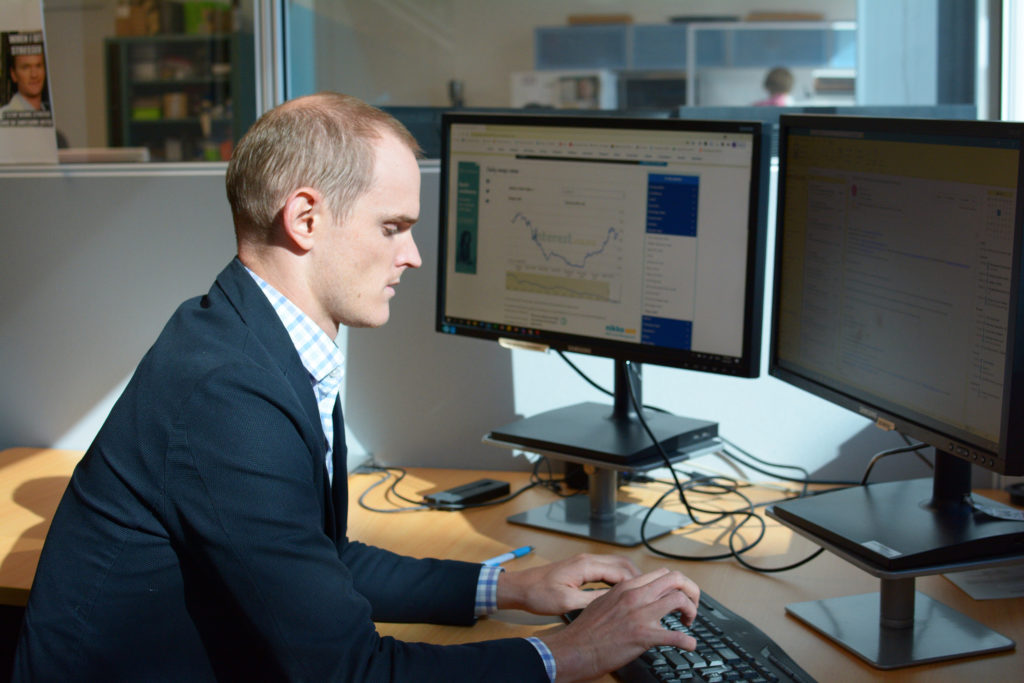
15 Apr Field Notes: Daniel Mazengarb
Daniel Mazengarb is an alumnus of the Residential Internship (2010/11) and, along with his wife Melissa, participated in the Vocational Programme Auckland (2019). Dan and Mel live in Mangere Bridge, Auckland, with their two sons, Jimmy and Toby. Dan is a Senior Lender at Christian Savings and has a background in Commercial Law. For this edition on work, we sat down for a conversation with Dan to hear about his work, family life, and faith, and to understand how each of these feed one another.
Tell us about your work journey to this point. You graduated with a degree in Law and Economics, and now work at Christian Savings. How did you get here?
Yes, I graduated from Victoria University, Wellington, in 2012 with my bachelor’s, but I’ve never been particularly passionate about Law or Economics. And that tension continues today. While I really love my job, I don’t feel “called” to the legal profession.
After university, I worked for one year at Z Energy, starting with legal experience but then moving into business strategy and forecasting. Melissa and I got married in 2014, and we moved to Tauranga, where I worked as a commercial lawyer for three years. I realised pretty early on that Commercial Law is not what I wanted to do for the rest of my life. While I really enjoyed helping people and the thrill of working through transactions, I wanted to move past covering clients’ butts. I wanted to work at a higher level of business and transactions. I knew that just being a lawyer would soon tire me out because it didn’t meld well with my strengths or what I enjoy doing.
After three years of work—myself in Commercial Law and Melissa in Human Resources—we went travelling overseas for six months. We finished our travels in Auckland so that Melissa could study theology at Carey College. Meanwhile, I needed a job. I was changing direction from Commercial Law to Litigation and applied to over 40 law firms, which resulted in tonnes of rejections. I only found my current job by being in a bar at the same time my father-in-law was meeting with the CEO and Chairman of Christian Savings. It was totally out of the blue. We were just in Auckland for a short-term stint for Mel to finish her study, and I didn’t want to take the job because it was going back into Commercial Law. But I took a punt, thinking it would only be for a year. Early on, I was exposed to a lot more of the work of Christian Savings and was able to move into the lending role. I’ve been at Christian Savings now for four years.
And what is Christian Savings?
Christian Savings finances churches and Christian charities around New Zealand. We take term deposits from the public in a standard commercial engagement. It’s a win–win for Christians because they get a return for their money, often at a higher rate than the banks, and their money is being used to give loans to churches and charities. With that money, churches and charities can finance a new build, extend their buildings, or create a new business, like a Christian day-care centre or school. Christian Savings is a very unique organisation. As far as we know, we think it’s the world’s only not-for-profit, multi-denominational finance company. We’re owned by multiple denominations and philanthropic trusts, and we’re a not-for-profit financier. It’s a really special ecumenical partnership.
You’ve mentioned that you don’t have a strong passion for Law or Economics, nor do you feel a special “calling” from God to the profession. And yet, your role at Christian Savings appears to be a special fit for someone of your skillset. How do you understand calling in light of that?
One of the things that has really shaped my understanding of work and its value was Summer Conference, back in 2010. The key change for me came from the teaching at the end of the conference on the new heavens and the new earth. Prior to that, I had assumed that the end times meant the entire world was going to burn up. Everything we did until that point was relatively meaningless unless you worked for a church or missionary society. Learning about the new heavens and the new earth, and the reality that God is inviting us into creating and being part of that new creation, meant that everything required for a new creation was and is important.
This included all types of work. Work went from being a necessary drudgery or a necessary evil to work being a good in and of itself, and that all work across the spectrum, not just ministry in the church, could be valuable and pleasing to God. It destroyed that hierarchy where Christian ministry is on top, more important than being a lawyer or a bus driver.
I have never had a strong sense of calling to a particular career. I feel like there was providence in how I got the job and the doors that have opened, but I never felt a God-ordained calling to work for Christian Savings. However, when the job presented itself, I pressed into an area that I saw I could add value, that I really enjoyed, and that I believed in. I didn’t feel a spiritual sense of calling towards that position.
The skills as a lawyer and having studied Economics are invaluable for the job that I do. But the reason I engaged with it so readily was because it’s so relationships and outcomes based. Not only are the skills important, but it really touches on my strengths: working with people, trying to find solutions, seeking good outcomes, and strategy.
When I was young, I was always hopeful that I’d have a God-ordained purpose, and once I found that purpose, I’d know. My experience working at Christian Savings has taught me that’s not often the case for most people. Whilst there are a few people with specific callings and careers—called by God in that sense—for most of us, work is about finding a place where we can add value and where we can work for a cause that we believe in—even if that cause isn’t as grand or illustrious as working on the mission field in Africa.
In light of this understanding of work and calling, what does paid work mean or represent in your life?
I’ve always had a pragmatic sense towards work. In my mind, there’s a hierarchy of needs: the base layer, and most important need, has been to provide for my family; next in the layer would be finding something I’m good at, that I can add value to; and then the top layer is doing something that I believe in, that’s doing good, with a vision that I can buy into. Whereas I think in some church cultures, that pyramid is flipped: where you need to firstly find the thing you absolutely love, you’re absolutely passionate about, and is changing the world. I feel that for me, I’ve learned to take a more pragmatic approach.
Getting married and having children brings home the practical necessity of work and has removed me from the centre of the universe. It’s definitely changed my perspective. All of a sudden, my approach to work isn’t about my own happiness and my own fulfilment but the greater good of my family. As you have a family, ideally you become less self-focused; you have others to think about. Your focus shifts and your scope expands, and that can help you get through a tougher or drier day because you know that the purpose of turning up to work is not just to be happy or to fulfil a calling that’s been on your life since you were born. Instead, you think about your children or your wife, and that now you have some money to put some clothes on their backs or to go on nice holidays.
How does your understanding of paid work relate to your wider vocation—as Christian, husband, father, and member of your local church?
I think vocation has become a multi-stranded picture of my life. Compared to when I was young, my career is a smaller portion of the picture. As you go through life, different strands become more important. My approach to parenting and the importance of parenting has become more significant as I get older; it moves from keeping them alive to teaching them how to interact in the world. So, when it comes to vocation and career, whilst my career is part of my vocation, it has become less significant in comparison to the other things I have responsibility for: being part of the Church, being a good husband, and being a good father.
I also think it’s more about the integrity with which you go about your work than about the work itself. I think you can have a sense of walking within God’s desired purpose, almost no matter what you do, because often it’s the way in which we approach these things rather than the thing itself. With the proviso that this is subject to that middle tier of that pyramid—having something to contribute, doing something that aligns with your skillset, and having the value for what you do and also pairing it with where your skills lie.
I think there’s a lot of anxiety at the start of peoples’ careers to get it right the first time: to land a job where you’re highly praised, you’re well paid, and you have a vision to fight for. When it comes to finding the right fit, there’s a lot of trial and error along the way. And those errors don’t detract from the end goal but can actually contribute to it. While I learnt that I wasn’t going to make it as a commercial lawyer long term, those three years of working in Commercial Law were essential for what I do now. It’s important to not be fearful of trying things out.
How do you think God sees your 9–5 work?
I don’t often find myself questioning if God values what I do because there’s such an obvious link. The work that I do is directly important to the facilitation and teaching of the gospel. We finance churches who are teaching about God. From an outcomes perspective, there’s an obvious link between what I do and the ways that it might be important to God.
But what’s often on my mind, when I think about this question, is the heart and integrity with which I do it. I believe that you can do good deeds with a bad or unhealthy heart or motivation. For me, I can get tied up with thinking about KPIs and hitting targets, and I can easily forget the actual impact of what I do. I think God cares about how I do my job: the care and the mindfulness I take in my role. If Jesus were at my desk, how would he pick up the phone? How would he take care with this difficult client? Every interaction is effectively an opportunity to reflect God or not. I’m very fortunate to be working in a career where a sense of meaning and social impact is easily found.
My job ticks so many boxes: I’m paid well, it has relatively good hours, I have lots to offer, I can make an impact, and what we do as a team is essential for the operation of churches and charities. So, yeah, I’m stoked!
What are some of the ways you navigate work and life decisions? How do you discern wisdom in these areas?
Mel and I did the Vocational Programme a few years ago, and one of the practices that emerged from that is our Sunday evening Sabbath routine. It’s the highlight of our week and the space where we discuss a lot of the questions of life, work, and vocation.
As soon as our last child goes to sleep, typically around 7:00pm, we stop all our activities, have a simple meal together, and carve out space to sit down and go through a set of questions:
- What have you been grateful for this week?
- Where have you seen God moving in the last week?
- An opportunity to share something from the week (thought or experience)
- What would you like prayer for?
We then pray about those things and pray together. It’s really special—a time in the week that’s ring-fenced and guarded. It’s become a time to stop and to reflect, and to be encouraged by God and by one another. Once we’ve finished, we do leisurely things, like read a book, but we don’t often watch a movie. Lately, we’ve just been going to bed!
For most of us, we use big events like New Year to have deep and meaningful conversations about our year, where we’re going, and what we’re doing. Those conversations are often really pivotal. This Sabbath rhythm allows us to have those opportunities every week instead of a few times a year. And there’s some really good disciplines that come from them, like gratitude—you can really see the fruits of that.
Our Sabbath routine has helped us navigate the questions of where we’re at and what we’re doing because the conversation reveals where God has been. As a couple, it’s made us a whole lot more aligned with where we’re going. It’s been absolutely life-changing. It’s one of those regular routines that doesn’t seem that spiritual or impactful at the time, but doing it on a consistent, weekly basis, we can see that deep roots are being formed.
(Images: Venn Foundation)



